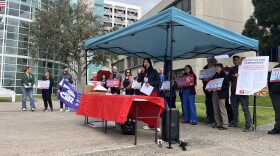One of the California Legislature's hottest criminal justice debates resumed Wednesday with competing proposals over when police can use deadly force, a topic that has torn the nation amid police shootings of young minority men.
Democratic Assemblywoman Shirley Weber of San Diego said she'll try again to set a nation-leading standard that would allow police to kill only when it is necessary to prevent imminent and serious injury or death.
"This means they may use force only if there is no reasonable alternative, including warnings, verbal persuasion or other non-lethal methods of resolution or de-escalation," Weber said.
She acted a day after two leading law enforcement groups proposed keeping the current legal standard that lets police open fire when they fear for their lives. The organizations representing California police chiefs and rank-and-file officers sweetened their proposal with calls for more training and an emphasis on trying to calm suspects before resorting to lethal force.
Democratic Senate President Pro Tem Toni Atkins of San Diego, who blocked Weber's bill last year amid heavy law enforcement opposition, said she hopes to find common ground this year between the competing bills.
She called the status quo "unacceptable."
"We must recognize that peace officers make incredibly difficult decisions in rapidly evolving situations? and deserve our protection," Atkins said in a statement. "And, we must acknowledge that we have a problem with disproportionate police use of force here in California and nationally, and that bias is often involved."
California currently lets officers use deadly force when they have a reasonable fear of being harmed, a standard that makes it rare for officers to be charged after a shooting and rarer still for them to be convicted.
Weber sought to change the standard last year shortly after Sacramento police shot and killed 22-year-old Stephon Clark, an unarmed black man, while searching for someone breaking into vehicles.
Sacramento is bracing for a decision by county prosecutors and the state attorney general on whether the two officers should face criminal charges, though experts said that is unlikely under current law.
Weber was backed at Wednesday's announcement by family members of people shot by police and by community activists who criticized California agencies for having some of the nation's highest rates of killings by police.
The activists included Cephus "Uncle Bobby X" Johnson, the uncle of 22-year-old Oscar Grant, who was shot to death a decade ago by a San Francisco Bay Area rapid transit police officer on New Year's Day.
Former BART Officer Johannes Mehserle was sentenced to two years in prison after he was convicted of involuntary manslaughter.
"If de-escalation tactics had been used and if we had a better deadly force law in California, Oscar Grant would be living today," Johnson said.
Peace Officers Research Association of California president Brian Marvel said that, while "one death is too many," the number of California law enforcement-related deaths dropped by one-third last year, from 172 in 2017 to 114 in 2018.
Weber's legislation would update California's use of force law, which dates to 1872, to comply with state and U.S. Supreme Court decisions that set the current standard.
Police could kill if an officer "reasonably believes the suspect poses an imminent threat of death or serious physical injury to the officer or others or when a fleeing suspect has committed a forcible and atrocious felony."
The police-backed legislation includes what Morgan Hill Police Chief David Swing, president of the California Police Chiefs Association, said would be a first in the nation requirement for law enforcement agencies to have policies that specify when officers should use de-escalation tactics and other options to deadly force; when they should provide medical aid after shootings; and how they should handle vulnerable populations, including people with mental illness.
Currently, 34 of the nation's 91 largest law enforcement agencies require officers to try to calm suspects when possible before using force, Swing said, while 30 require officers to stop other police from using excessive force and 15 require the detailed reporting proposed in the California legislation.
Their bill is carried by Sen. Anna Caballero, a moderate Democrat from Salinas who said her goal is "a policy that protects the public and our peace officers."
The competing bills set up sparring between moderate and liberal Democrats who together control two-thirds supermajorities in both chambers. It may empower Republicans, who could tip the balance by siding with the law enforcement version.





